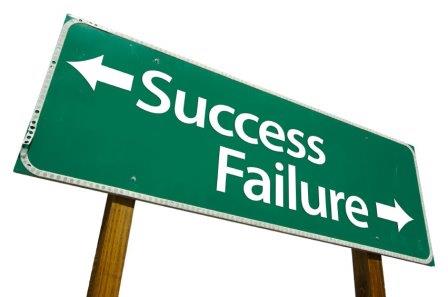Seven Lessons Marketing Failures Teach Us !
 Have you invested in a new idea, business or a new product that turned to a big failure? Congratulations! You have just come a step closer to great success! Despite customers and funds loss that usually follow an unsuccessful business endeavor, business history proves daily that every big success story hides at least one failure history. Of course, a failure is never a good thing, but what happens after the failure is more important for entrepreneurs. However small or great a failure may be, it always has something to teach us either to avoid it or get faster to success. Often though, many entrepreneurs are brought to the same mistake, thus forming some failures patterns which can be regarded as great lessons for new and existing entrepreneurs.
Have you invested in a new idea, business or a new product that turned to a big failure? Congratulations! You have just come a step closer to great success! Despite customers and funds loss that usually follow an unsuccessful business endeavor, business history proves daily that every big success story hides at least one failure history. Of course, a failure is never a good thing, but what happens after the failure is more important for entrepreneurs. However small or great a failure may be, it always has something to teach us either to avoid it or get faster to success. Often though, many entrepreneurs are brought to the same mistake, thus forming some failures patterns which can be regarded as great lessons for new and existing entrepreneurs.
Lesson 1 : In case you have created a great product, do not forget to inform consumers how great it is. For example, many IT companies are progressing product upgrades very quickly by spending time and financial resources in research and quality control. As a result, the companies are already going to the next updates without users having first met the previous versions.
IT companies are progressing product upgrades very quickly by spending time and financial resources in research and quality control. As a result, the companies are already going to the next updates without users having first met the previous versions.
Lesson 2 : Do not lean to the mentality “if you build, they will come” because it is rarely effective. Make sure you develop a solution for something that people consider to be a real problem. Many startup companies are trying so much to convince consumers that they need a product for which there is no substantial interest.
 Lesson 3 : It is very important to listen to your customers, but it is of outmost importance to make sure that you prioritize their needs and act on the things that matter to them most. Do not try to satisfy every request / feedback you receive from your customers. Instead, pay attention to those most of your customers need.
Lesson 3 : It is very important to listen to your customers, but it is of outmost importance to make sure that you prioritize their needs and act on the things that matter to them most. Do not try to satisfy every request / feedback you receive from your customers. Instead, pay attention to those most of your customers need.
Lesson 4 : It is important to analyze your entire customer network and not just the entry point. To focus on acquiring new customers is a great way to expand your business but is not always the best method to increase your revenue. Depending on the business model of the enterprise is often cheaper to keep an existing customer base than acquire a new one.
Lesson 5 : When you apply a new strategy, take the time to understand how applicable it could be as soon as possible. Of course, you may not be able to measure the ultimate goal (contacts converted to customers) immediately, but consider if there is something you can measure immediately that may indicate you are on the right track or not.
Lesson 6 : You should know how the mobility of your customers results and how visitors experience your website or browsing  on your pages. Once you understand, you can optimize the navigation menu specifically for your visitors. For example, a website can operate seamlessly on desktops but it may not operate properly on mobile phones. If the majority of your visitors visit your page from their cell phones, you may lose many potential customers. Most users want to browse the web pages just like on the facebook apps and Instagram, by that vertical scrolling (scroll down). If you know this information, you can optimize the corporate website and get the most traffic to it, turning visitors into clients faster and easier.
on your pages. Once you understand, you can optimize the navigation menu specifically for your visitors. For example, a website can operate seamlessly on desktops but it may not operate properly on mobile phones. If the majority of your visitors visit your page from their cell phones, you may lose many potential customers. Most users want to browse the web pages just like on the facebook apps and Instagram, by that vertical scrolling (scroll down). If you know this information, you can optimize the corporate website and get the most traffic to it, turning visitors into clients faster and easier.
Lesson 7 : When analyzing the possible marketing channels you use, you should consider a lot more than the exact cost (time  and money). Make sure you examine a possible marketing channel both by cost and by the potential investment return (ROI). For example, many shun traditional marketing channels due to high costs, focusing on fast and occasional promotions. However, these moves only lead to “fireworks” and quick wins, but does not build the brand and customer loyalty, which should lead to the development of the company in the long term.
and money). Make sure you examine a possible marketing channel both by cost and by the potential investment return (ROI). For example, many shun traditional marketing channels due to high costs, focusing on fast and occasional promotions. However, these moves only lead to “fireworks” and quick wins, but does not build the brand and customer loyalty, which should lead to the development of the company in the long term.
To conclude, whether you are a new entrepreneur or you’re considering an innovation, you should consider in advance all of the above mentioned parameters and be prepared for even a failure. What most successful businesses in today’s economy can teach us, is that poor handling of a failure is the real failure. If you locate and identify the error, then the next attempt will surely be one step closer to success.
References : Kevin Raheja, Clark (2013), Van Tussenbrook (2015), www.dkconsultants.gr

